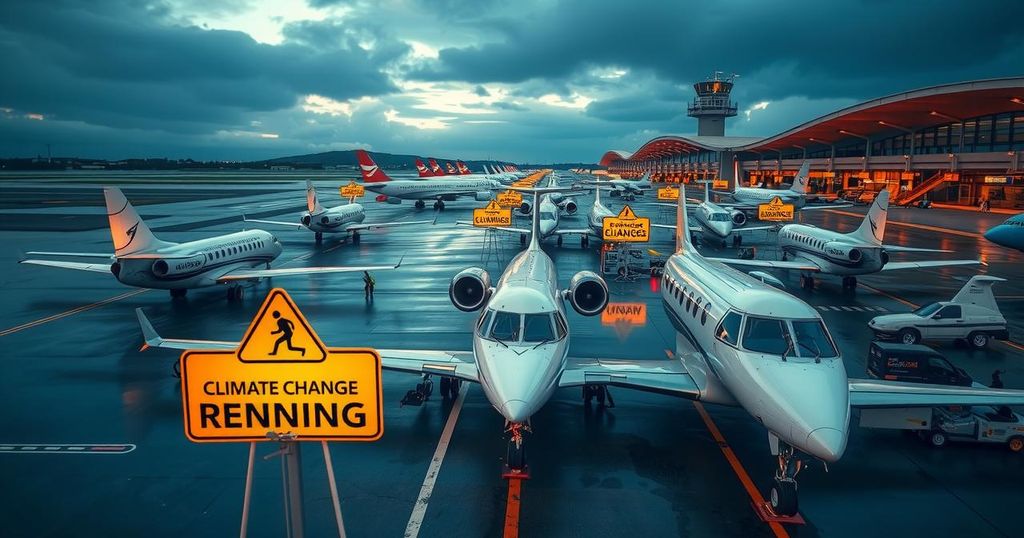Climate scientists warn that the ultra-wealthy have begun using private jets as casual transport, leading to a significant rise in carbon emissions. The research indicates a 46% increase in emissions from 2019 to 2023, with private flights generating 15.6 million tonnes of CO2. This trend reflects a growing disconnect between the lifestyle of the wealthy and global climate standards, with calls for immediate action to address the impact of private aviation on the environment.
Recent research conducted by climate scientists has highlighted a troubling trend among the ultra-rich who are increasingly using private jets for short-distance travel, akin to the convenience of taxi rides. From 2019 to 2023, emissions from private flights rose by 46%, with estimates indicating that in 2023 alone, these flights produced approximately 15.6 million tonnes of carbon dioxide. This pollution corresponds to emissions equivalent to those generated by around 3.7 million petrol cars annually. The scientists traced numerous flights worldwide, including short weekend trips to popular destinations such as Ibiza and travel to significant events like the Fifa World Cup and the UN climate conference in Dubai. Alarmingly, a single hour of flight on a private jet can release more carbon dioxide than an average person emits in an entire year. Professor Stefan Gossling, who led the research from Linnaeus University in Sweden, expressed concern that frequent private jet use might indicate a disconnect from global environmental standards among the rich. While the overall emissions from private jets represent a small fraction of global carbon emissions—about 1.8% of total aviation emissions—the impact per individual is substantial. For instance, there are around 256,000 ultra-high-net-worth individuals globally, each typically worth about $123 million. Some individuals tracked in the study flew privately up to 169 times in a single year, resulting in emissions comparable to those produced by hundreds of vehicles over the same period. Notably, the dominance of private jet registrations was found in the United States, accounting for 69% of the total. The researchers analyzed the data of over 18 million flights, utilizing flight-tracking data from ADS-B Exchange, which is recognized as a reliable source for such information. The findings reveal that a significant percentage of private flights, nearly half, were less than 500 kilometers in distance. The trend of flying private jets for leisure activities or attending events such as film festivals raises pressing questions about the responsibility of the ultra-rich in addressing climate change. Looking ahead, the researchers warn that action against climate change is crucial, underscoring the need for higher-income individuals to set an example in reducing emissions. Without immediate intervention, projections indicate that global temperatures could rise by more than 3.1°C by the end of the century, exacerbating climate change impacts. The International Air Transport Association has set a goal for net-zero emissions in aviation by 2050, but skepticism remains regarding feasible alternatives to traditional fueling methods. This research has been published by the scientific journal “Communications Earth & Environment,” emphasizing the urgency of addressing private aviation’s environmental impact and the responsibilities of those who can afford such luxuries.
The increasing reliance on private jets among the world’s wealthiest individuals raises significant concerns regarding climate change and the environment. Recent data indicates that the emissions from private flights have escalated dramatically in recent years, highlighting the broader implications of luxury travel on global warming. The research focuses on quantifying the carbon footprint of these private flights, underscoring the discrepancy in emissions between individuals with extravagant lifestyles and the average global citizen. With aviation contributing significantly to global emissions, understanding the role of private aviation is essential in the fight against climate change.
The findings of this research present a stark reminder of the environmental toll associated with the lavish lifestyles of the ultra-wealthy, particularly concerning private jet usage. As carbon emissions from private flights soar, it is imperative for affluent individuals to take responsibility for their environmental impact. With climate scientists urging a collective effort to mitigate emissions, addressing the unchecked growth of private aviation will be pivotal in achieving global climate goals and preventing catastrophic climate change outcomes.
Original Source: www.bbc.com







